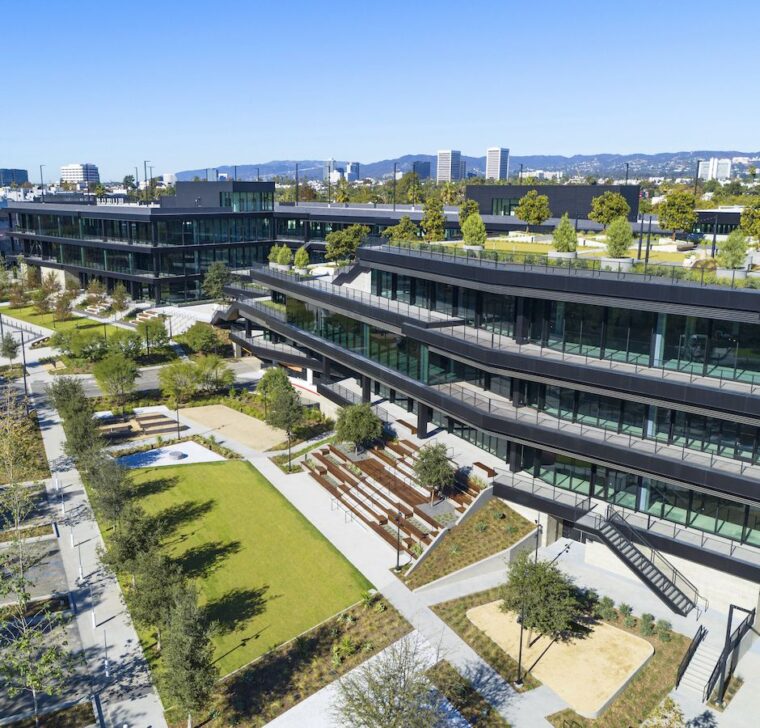
The University of California Los Angeles (UCLA) will transform a nearly 40-year-old mall into a multidisciplinary research center that will help scientists develop tools, treatments and vaccines for various health issues such as cancer, autoimmune and immune deficiency disorders, infectious diseases, heart conditions and organ transplants.
The UCLA Research Park will house the California Institute for Immunology and Immunotherapy as well as the UCLA Center for Quantum Science and Engineering. University officials announced their plans Jan. 3 with Gov. Gavin Newsom.
“California is the epicenter of global innovation – from the creation of the internet to the dominance of artificial intelligence, humanity’s future happens here first,” Newsom said in a press release. “Leveraging the next waves of technology and science – quantum computing and the immense potential of immunology – the UCLA Research Park will cement California’s global economic, scientific and technological dominance into the 22nd Century and beyond.”
The Center for Quantum Science and Engineering will allow researchers to continue studying the behavior of subatomic particles. In the past two years, the center has received millions of dollars in financial contributions from Boeing and the National Science Foundation. Expanding the center will further research with its partners.
“UCLA’s goal is to build the immunology equivalent of Silicon Valley in Los Angeles,” said John Mazziotta, vice chancellor for health sciences and CEO of UCLA Health. “Given the university’s expertise and state-of-the-art facilities, we are expecting to attract the world’s best scientists in immunology and immunotherapy, as well as top students.”
Located 2 miles from the UCLA Westwood campus, the UCLA Research Park will occupy 700,000 square feet of space at the former three-story Westside Pavilion mall. The university purchased the site for $700 million from real estate firm Hudson Pacific Properties and Macerich, a retail and mixed-use development firm.
By Hudson Pacific Properties
The state of California recently contributed $500 million to the purchase, in addition to $200 million already contributed. By investing in an existing property, the state anticipates saving $223 million and opening years ahead of UCLA’s schedule.
The two firms had already made upgrades to the property, including seismic retrofitting for earthquake resilience and adding new concrete facades, an enclosed pedestrian bridge connecting the two buildings, courtyards and other outdoor spaces. The firms worked with Google, which had planned to lease the property long-term, to convert part of the site into a flexible office space.
“We transformed the former Westside Pavilion mall into a multi-award winning, modern and flexible campus environment that attracted not one, but two distinct large-scale, high-quality end-users, a testament to our ability to create value through development expertise, commitment to quality and strong relationships,” Hudson Pacific Chairman and CEO Victor Coleman said in a news release.
Details regarding a timeline for the center’s opening or what construction is needed to ready the site is not yet known, UCLA’s office of media relations told Government Market News. However, the university did announce it could covert the former multiscreen movie theater into lecture halls or performance spaces.
“The Research Park directly embodies UCLA’s strategic priority of expanding scholarship and engagement to benefit the public good,” Roger Wakimoto, UCLA’s vice chancellor for research and creative activities, said in the news release. “The park’s scientific, technological, humanistic and creative advances will help to promote economic growth throughout the Southern California region and beyond.”
By David Esquivel/UCLA
The University of California system has been investing billions in its campuses to further research and innovation. In October, UC Berkeley announced a $2 billion innovation center focused on advancing space exploration, aviation, quantum computing and climate studies.
The Westside Pavilion acquisition also is not the first time UCLA purchased an existing building for a new location. In June, UCLA announced it acquired the nearly 100-year-old Trust Building in downtown Los Angeles to expand its presence. The building will house some programs and offices for UCLA Extention, which offers continuing and professional education courses.
Other research hubs in the works include one The University of Texas-Dallas is planning with a $30 million investment from the U.S. Department of Defense to create a battery technology research center with worker training programs.
All news and information on this site is provided by the team at Strategic Partnerships, Inc. Check out this short 1-minute video that provides a quick overview of how we work with clients.
Photos courtesy of UCLA
The post UCLA buys former mall for $700 million to transform into research center appeared first on Government Market News.
